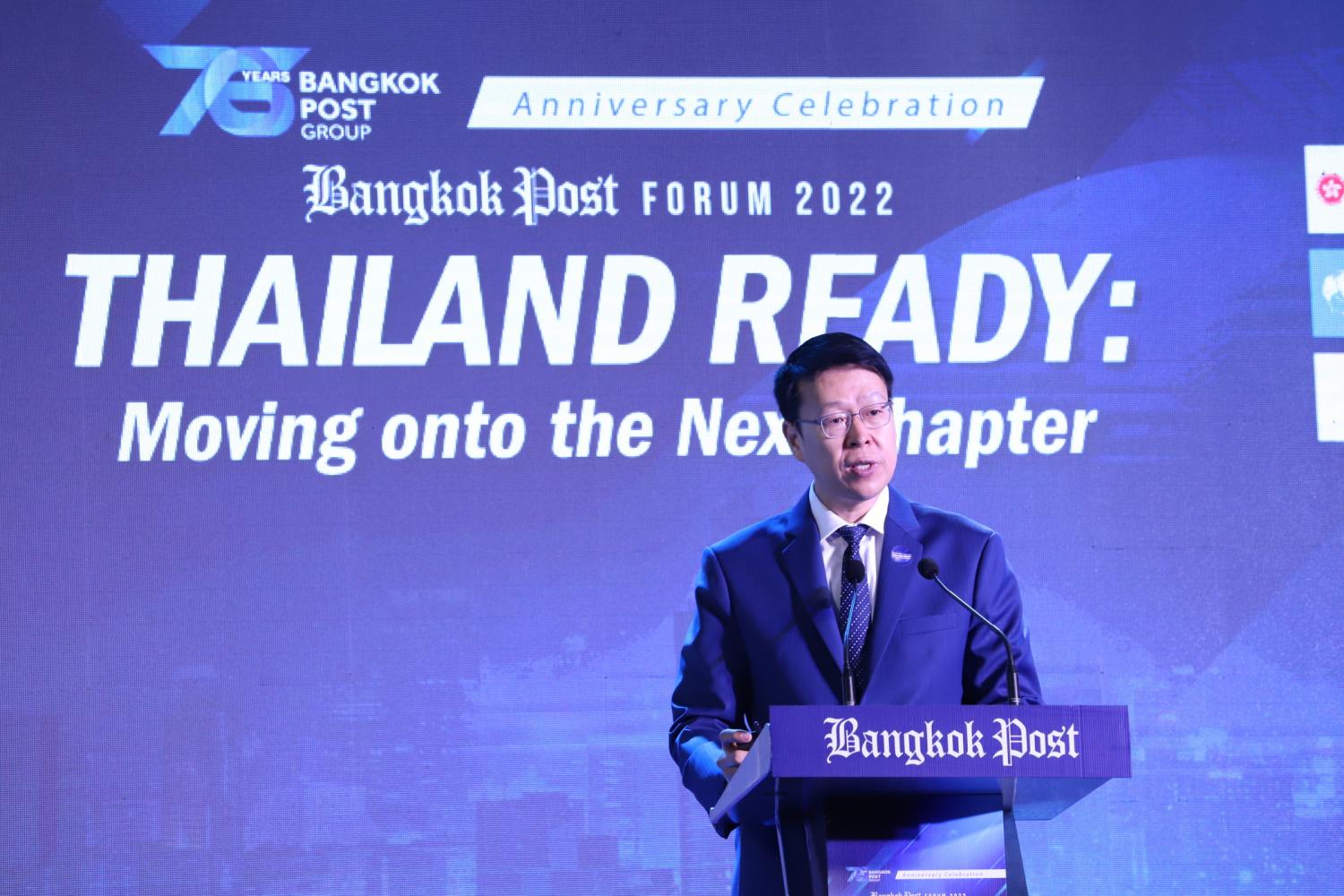
Industry leaders shared views of how the country should move forward, from creating multiple economic growth engines to the promotion of the electric vehicle (EV) industry, to allow Thailand to attain economic sustainability.
Kattiya Indaravijaya, chief executive of Kasikornbank, said even if it's a rocky road ahead, the private sector and banks are ready for the next chapter.
She made the remark at the Bangkok Post Forum 2022 "Thailand Ready: Moving onto the Next Chapter", hosted by Bangkok Post on Wednesday to discuss the political, economic and social challenges post-Covid, as selected by various pundits.
Ms Kattiya said the Thai economy has started to return to normalcy from the pandemic, reflected by higher tourist arrivals, a rebound in domestic consumption and elevated export growth.
She identified challenges for Thailand going forward, including persistently high production costs, increased household debt and geopolitical conflicts. Thailand also needs to prepare for global megatrends, such as technological disruption, silver age society and the environmental, social and governance (ESG) movement, said Ms Kattiya.
These trends can be viewed as either threats or opportunities to business. For example, she said technological disruption can also allow a business to grow at an accelerated pace, depending on its ability to identify where opportunities lie and using them as advantages.
"We must be well prepared to grab these opportunities," Ms Kattiya said.
ECONOMIC ENGINES
She is concerned that in the near term, Thailand's economy will be mainly driven by only tourism, as there are risks and challenges for other growth engines such as exports and consumption.
To provide the country more potential growth engines and remain competitive, an industrial and business restructure must be prioritised, said Ms Kattiya.
Looking at Thailand's strengths, many industries have posted stellar performances. Among them are the food, healthcare and automotive sectors, in addition to tourism, she said.
Thailand needs to upgrade and create added value in its food production throughout the supply chain, said Ms Kattiya. Examples of value-added food products include healthy plant-based or medical foods.
For healthcare, Thailand has earned a positive reputation and the nation must advance its services to meet growing demand for health-conscious options as complex diseases emerge, she said.
In terms of automotive production, Thailand must strive to become an EV production base, in line with ESG trends, said Ms Kattiya.
For the tourism sector, she said it is essential for Thailand to expedite its drive towards creating sustainable tourism by focusing on creating products that represent Thai identity and make foreign visitors feel that visiting here is a beneficial experience for both the society and the environment, in line with the ESG trend.
All these sectors involve a lot of parties and small and medium-sized enterprises in the supply chain, said Ms Kattiya. Their employment is relatively high, with a combined tally of more than 5 million employees.
If the country can drive these sectors forward, it could generate additional income for Thais and enable the nation to have multiple engines to drive the economy in the medium and long term, she said.
To achieve these ambitions, the country requires a collaborative effort between the public and private sectors to support not only funding and technology, but also improvements in labour productivity, said Ms Kattiya.
In terms of contributions from the banking sector, it has facilitated business survival by providing financial and non-financial products that can help firms save on costs and support them in overcoming limitations, she said.
The banking industry is also making financial services more inclusive to smaller customers via digital banking and digital lending services, said Ms Kattiya.
EV EMPHASIS
The EV industry can pave the way for Thailand to attain sustainability, both in the economy and environment for the long term, said Chakart Seanchan, chief executive of Leadway Heavy Machinery Co.
EV technology will become the world's largest investment in 2025, he said.
"We will see EVs on the road, in the sea and over the sky. EVs are driving the transport sector and many companies will embrace EVs as part of their business," said Mr Chakart during the forum.
Investment in EV-related technology will cover a range of businesses from expansion of electrification to agriculture, which can draw up to US$2 trillion in capital spending annually and significantly curb greenhouse gas emissions, according to a study conducted by McKinsey & Company.
In the electrification sector, the technology can support the growth of battery EV manufacturing and software for battery management.
In the agricultural sector, farm machines will be designed to be more environmentally friendly, with zero carbon dioxide emissions, according to the study.
Mr Chakart said EV technology promises economic and environmental benefits, helping Thailand depend less on fossil fuels and aiding in the fight against global warming.
Last year, Prime Minister Prayut Chan-o-cha vowed during the 26th UN Climate Change Conference in Glasgow that Thailand would try harder to address climate change, striving to reach carbon neutrality, a balance between carbon dioxide emissions and absorption, by 2050, and a net-zero target, a balance between greenhouse gas emissions and absorption, by 2065.
Businesses can benefit from EV technology by saving on energy costs and ensuring sustainable growth, said Mr Chakart.
Leadway is interested in electric heavy trucks. He said trucks will be "getting smarter" with the EV technology.
Mr Chakart is aware insufficient EV charging facilities and charging times are a concern, but said these issues can be resolved by a battery swapping service.
Truck drivers with low battery levels can replace them with fully charged batteries, without spending time to charge.
"Heavy trucks need only 1.9 minutes to swap batteries. It is so speedy," he said.
Each battery swapping station can be designed to serve up to 100 vehicles, said Mr Chakart.

Mr Chakart addresses how EVs can be a game changer in Thailand's heavy machinery industry. Pattarapong Chatpattarasill